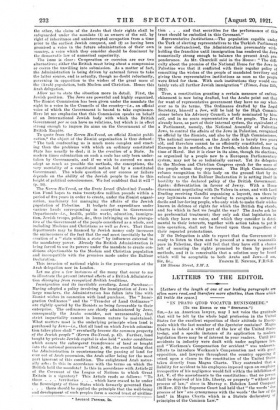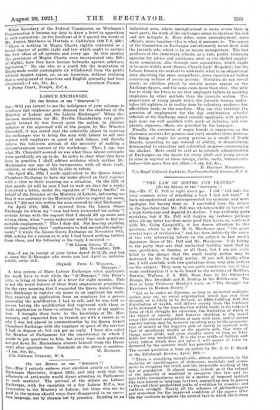LETTERS TO THE EDITOR.
[Letters of the length of one of our leading paragraphs are often more read, and therefore more effective, than those which fill treble the space.]
"IN PRATO QUOD VOCATUR RUNINGMEDE."
crn vas EDITOR or vas "SPLOTATOS."] Sra,—As an American lawyer, may I not voice the gratitude that will be felt by the whole legal profession in the United States for the excellent exposition of their attitude to Runny- mede which the last number of the Spectator contains? Magna Chaste is indeed a vital part of the law of the United States to-day, and a specific instance of its application to modern legislation there may be of interest to your readers. Until 19116 accidents in industry were dealt with under negligence law, and "Workmen's Compensation for accident" was unknown. Efforts to introduce Workmen's Compensation met with great opposition, and lawyers throughout the country opposing it seized upon a clause in the constitution of the -United States taken directly from Magna Charts. They contended that a liability for accident to his employees imposed upon an employer irrespective of his negligence would fall within the inhibition of Art. V. of the amendments to the constitution : that no Pet's" shall be deprived of his life, liberty, or property " without due process of law," since in Murray v. Hoboken Land Company (18 How. 272) the Supreme Court had held that " the words due process of law ' are synonymous with the words ' the law of the land' in. Magna Charta which is a Statute declaratory of principles of the Common Lai."
When Secretary of the Federal Commission on Workmen's 'compensation it became my duty to draw a brief in opposition to such contention : in the forefront of it I quoted the words of Mr. Justice Matthews in Hurtado v. California (110 U.S. 530): " There is nothing in Magna Charts rightly construed as a broad charter of public right and law which ought to exclude the best ideas of all systems and every age. In this country the provisions of Magna Charts were incorporated into Bills of Rights; here they have become bulwarks against arbitrary legislation." No one who as a youth felt the inspiration of Runnymede could contemplate its withdrawal from the public without deepest regret, or, as an American, without realizing that a seed-ground of American and English sympathy had been



































 Previous page
Previous page